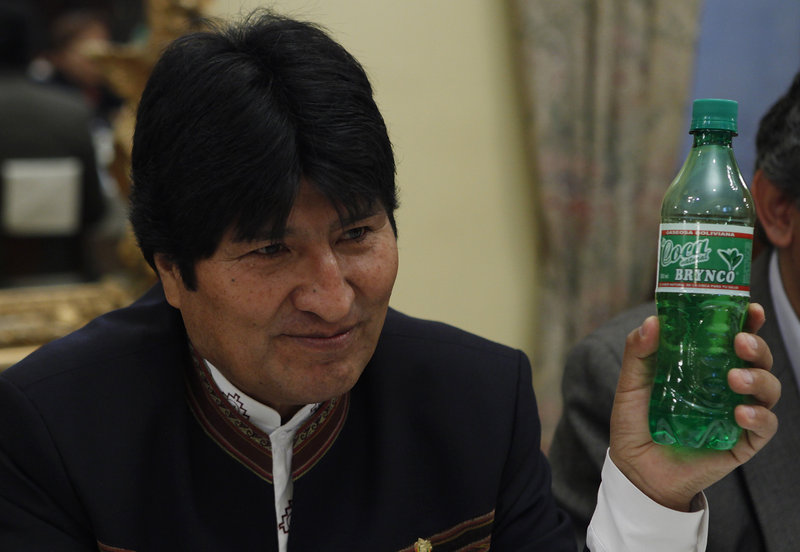BOGOTA, Colombia — The U.S. will file a formal objection today to Bolivia’s proposal to end the ban on coca leaf-chewing contained in a half-century-old U.N. treaty, according to a senior U.S. government official.
“We hope that a number of other countries will file as well,” the official told The Associated Press on Tuesday. He spoke on condition that he not be further identified, citing the topic’s political sensitivity.
Despite being stigmatized as the raw material of cocaine, coca leaves have been chewed by indigenous peoples in the Andes for centuries.
A mild stimulant, the leaves have deep cultural and religious value in the region. Chewed or consumed as tea, coca counters altitude sickness, aids digestion and quells hunger and fatigue.
Jan. 31 is the deadline for nations to raise objections with the United Nations to Bolivia’s proposed amendment to the 1961 Single Convention on Narcotic Drugs to remove language that obliges signatories to prohibit the chewing of coca leaves. If no objections are registered, the amendment would automatically take effect.
Bolivia’s leftist government, which is led by a former coca growers union leader, and its supporters contend the language they want removed is discriminatory.
The 1961 convention’s stipulation that coca-chewing be phased out within 25 years after it took effect in 1964 is based on a “blatantly racist” 1950 report, according to two liberal advocacy groups, the Washington Office on Latin America and the Transnational Institute. The Bolivian proposal would leave in place language that made coca leaves a controlled substance.
Bolivian President Evo Morales launched a global campaign after his 2005 election seeking to declare coca legal, chewing it at international forums and presenting coca leaf-embossed art works and musical instruments to foreign officials, including then-U.S. Secretary of State Condoleezza Rice.
“How can it be possible that the coca leaf, which represents our identity, which is ancestral, be penalized,” Morales, an Aymara Indian, told reporters Friday before dispatching his foreign minister to Europe to lobby for the proposal.
Washington argues that the amendment would open the nearly 50-year-old convention to attack by any U.N. member nation that would seek to exclude for parochial reasons one of the 119 substances the convention classifies as narcotics, submitting them to strict controls.
Trying to carve out such exceptions “over the long term is not good for the planet’s efforts to control and eventually solve the problem of drug abuse,” the senior U.S. official said. He said Washington also fears it could open a Pandora’s box of legal challenges to drug convictions in the United States.
The official said “there is evidence to suggest that a substantial percentage” of the increased coca production in Bolivia over the past several years, registered in U.N. surveys, “has indeed gone into the network and the marketplace for cocaine.”
Send questions/comments to the editors.



Success. Please wait for the page to reload. If the page does not reload within 5 seconds, please refresh the page.
Enter your email and password to access comments.
Hi, to comment on stories you must . This profile is in addition to your subscription and website login.
Already have a commenting profile? .
Invalid username/password.
Please check your email to confirm and complete your registration.
Only subscribers are eligible to post comments. Please subscribe or login first for digital access. Here’s why.
Use the form below to reset your password. When you've submitted your account email, we will send an email with a reset code.